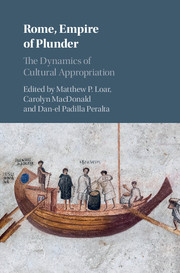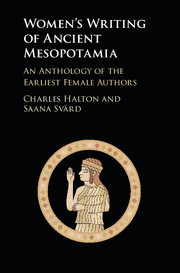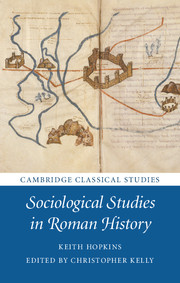Refine search
Actions for selected content:
23990 results in Ancient history
8 - The Jews: οἱ Ἰουδαῖοι
-
- Book:
- Outsider Designations and Boundary Construction in the New Testament
- Published online:
- 11 October 2017
- Print publication:
- 26 October 2017, pp 150-176
-
- Chapter
- Export citation
Frontispiece
-
- Book:
- Author and Audience in Vitruvius' <I>De architectura</I>
- Published online:
- 16 November 2017
- Print publication:
- 26 October 2017, pp iv-iv
-
- Chapter
- Export citation
Preface
-
- Book:
- Outsider Designations and Boundary Construction in the New Testament
- Published online:
- 11 October 2017
- Print publication:
- 26 October 2017, pp vii-x
-
- Chapter
- Export citation
Three - Literacy as Technology and Practice
- from Part I - Understanding Literacies, Material Culture and Practice in the Roman World
-
- Book:
- Writing and Power in the Roman World
- Published online:
- 31 October 2017
- Print publication:
- 26 October 2017, pp 41-50
-
- Chapter
- Export citation
General Index
-
- Book:
- Author and Audience in Vitruvius' <I>De architectura</I>
- Published online:
- 16 November 2017
- Print publication:
- 26 October 2017, pp 232-238
-
- Chapter
- Export citation
2 - Methodology: Insights and Perspectives from Other Areas of Study
-
- Book:
- Outsider Designations and Boundary Construction in the New Testament
- Published online:
- 11 October 2017
- Print publication:
- 26 October 2017, pp 1-8
-
- Chapter
- Export citation
Copyright page
-
- Book:
- Colonization and Subalternity in Classical Greece
- Published online:
- 18 November 2017
- Print publication:
- 26 October 2017, pp iv-iv
-
- Chapter
- Export citation
Six - Mountains
-
- Book:
- Colonization and Subalternity in Classical Greece
- Published online:
- 18 November 2017
- Print publication:
- 26 October 2017, pp 164-196
-
- Chapter
- Export citation
3 - House and Man
-
- Book:
- Author and Audience in Vitruvius' <I>De architectura</I>
- Published online:
- 16 November 2017
- Print publication:
- 26 October 2017, pp 83-129
-
- Chapter
- Export citation
Part I - Understanding Literacies, Material Culture and Practice in the Roman World
-
- Book:
- Writing and Power in the Roman World
- Published online:
- 31 October 2017
- Print publication:
- 26 October 2017, pp 1-50
-
- Chapter
- Export citation
Eleven - Literacy, the Body and Elite Identities
- from Part III - Writing Equipment in Funerary Contexts and the Expression of Identities
-
- Book:
- Writing and Power in the Roman World
- Published online:
- 31 October 2017
- Print publication:
- 26 October 2017, pp 190-223
-
- Chapter
- Export citation

Rome, Empire of Plunder
- The Dynamics of Cultural Appropriation
-
- Published online:
- 25 October 2017
- Print publication:
- 19 October 2017

Women's Writing of Ancient Mesopotamia
- An Anthology of the Earliest Female Authors
-
- Published online:
- 23 October 2017
- Print publication:
- 02 November 2017

Sociological Studies in Roman History
-
- Published online:
- 20 October 2017
- Print publication:
- 02 November 2017
Copyright page
-
- Book:
- The Politics of Heresy in Ambrose of Milan
- Published online:
- 06 October 2017
- Print publication:
- 19 October 2017, pp i-iv
-
- Chapter
- Export citation
Conclusion
-
- Book:
- The Politics of Heresy in Ambrose of Milan
- Published online:
- 06 October 2017
- Print publication:
- 19 October 2017, pp 214-286
-
- Chapter
- Export citation
Introduction
-
-
- Book:
- Rome, Empire of Plunder
- Published online:
- 25 October 2017
- Print publication:
- 19 October 2017, pp 1-12
-
- Chapter
- Export citation
Abbreviations
-
- Book:
- Rome, Empire of Plunder
- Published online:
- 25 October 2017
- Print publication:
- 19 October 2017, pp xii-xii
-
- Chapter
- Export citation
Chapter 14 - Circulation’s Thousand Connectivities
- from Part III - Circulation
-
-
- Book:
- Rome, Empire of Plunder
- Published online:
- 25 October 2017
- Print publication:
- 19 October 2017, pp 261-270
-
- Chapter
- Export citation
Abbreviations
-
- Book:
- The Politics of Heresy in Ambrose of Milan
- Published online:
- 06 October 2017
- Print publication:
- 19 October 2017, pp viii-ix
-
- Chapter
- Export citation
